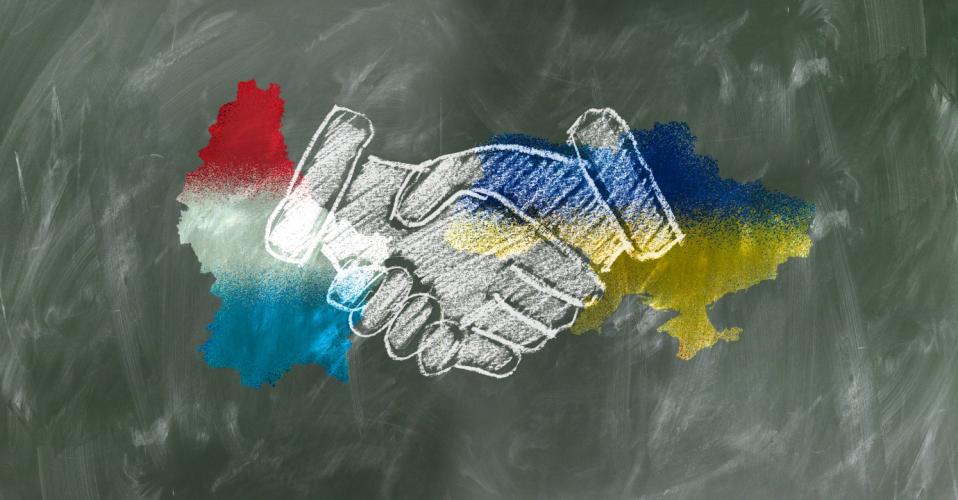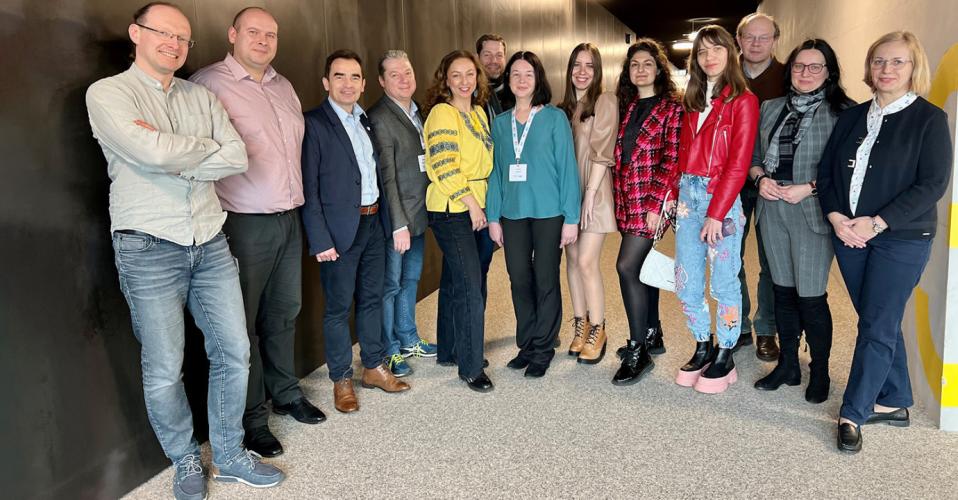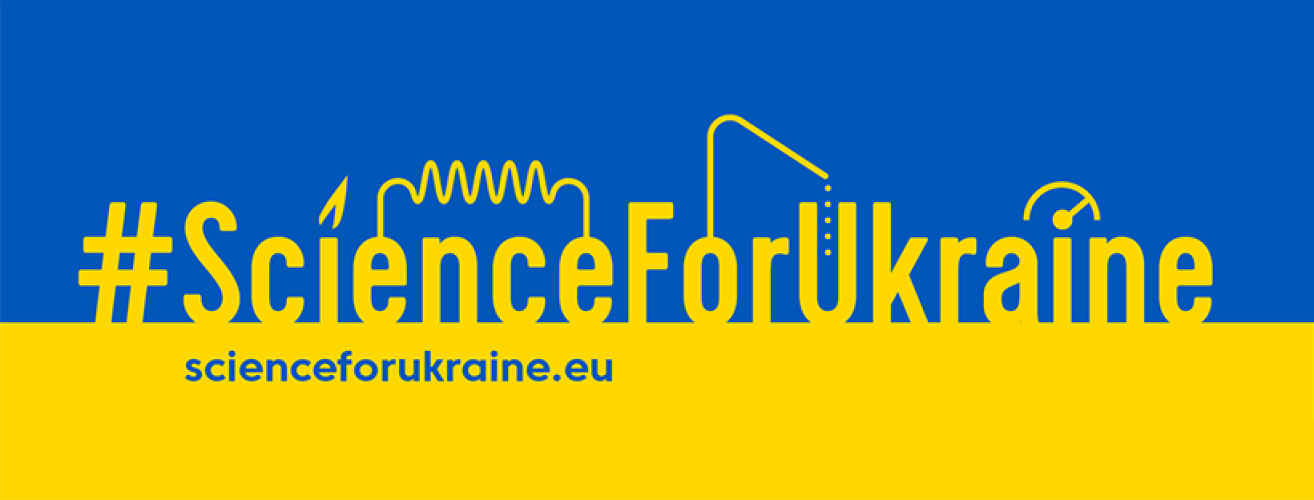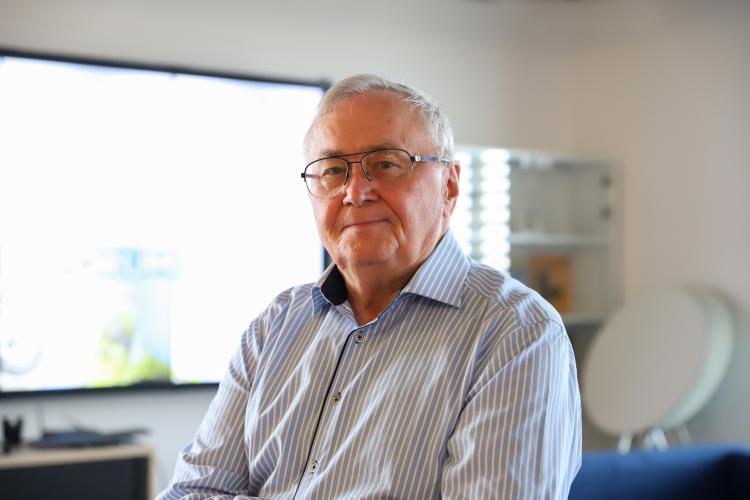These activities can be grouped into three phases: A first phase beginning in March 2022 was characterised by an immediate humanitarian response to the outbreak of the war. This phase saw the creation of the fellowship programme and the search for accommodation, the beginning of data rescue efforts, documentation, and preservation activities as well as private initiatives to help Ukrainians flee the country.

The second phase between March and June was characterised by consolidation. In this phase efforts focused on the integration of four fellows through the provision of housing, contracts and mentorship; coordination with parallel efforts by the University of Luxembourg; and the completion of initial data rescue initiatives and applications for extension grants offered by the FNR.
In April the C²DH joined the Science for Ukraine initiative and C²DH Assistant Professor Marten Düring took on the role of national coordinator for Luxembourg. Science for Ukraine has evolved into an international network of researchers and continues to negotiate positions for Ukrainian researchers, raise awareness of their needs and facilitate their integration within hosting institutions.
The third phase since June 2022 has focused on sustainable, future-oriented support. During this time the Luxembourgish-Ukrainian Research Network (LURN) was initiated by Inna Ganschow and Marten Düring, LURN events offer both training and networking opportunities for Ukrainian researchers. Since spring 2023, the event series has been coordinated by Ukrainian scholars Zhanna Serdiuk, Olga Kryvets and Aleksey Aleksandrov., In parallel, a Ukrainian team was created for the Programming Historian project, the Saving Ukrainian Cultural Heritage Online (SUCHO) initiative was consolidated and oral history interviews began for the WARLUX extension projects.

A research partnership was set up between the Lviv Centre for Urban History and the C²DH. As a first measure, and in cooperation with the University of Luxembourg, the C²DH successfully backed up 50 terabytes of research data owned by the Lviv Centre for Urban History. The C²DH has also offered its book scanning infrastructure to collect and digitise books written and provided by Ukrainian scholars.
At the time of writing, most do not expect the war to end any time soon. This means that we need to revisit past support activities and reflect on their success and effectiveness, to adjust measures according to the current situation and to identify new opportunities for support, also in light of their impact on the centre and its ongoing research and teaching activities. Overall, the centre intends to continue its support activities, orienting its efforts towards the development of the future Ukrainian research landscape.
Luxembourg support activities for Ukrainian researchers and students are for the most part initiated and financed by the Luxembourg National Research Fund (FNR), the University of Luxembourg, and individual research centres and complemented by non-institutional volunteer initiatives.
Full report on C2DH Activities in support of the Ukrainian Research Community

In March 2022, the C²DH opened up four fellowships for Ukrainian researchers. Over the next few weeks, Valentyna Kuryliak and Svitlana Mizerhy from University of Kyiv, Kateryna Zakharchuk from Khmelnytskyi National University, Volodymyr Nemchenko from Kharkiv National University joined the C²DH as visiting fellows.
Testimonial of Svitlana Miserzhy about her stay at the C²DH from 1 June to 30 August 2022:
“The fellowship was terminated because my home university, Bogomolets National Medical University, which is part of the national security sector, obliged employees to return to their Ukrainian workplace.
I worked for two months on my research project, “History of interaction paradigmatic approaches to understanding the language issue in Ukrainian socio-humanitarian thought”.
The fellowship opportunity enabled me to refine my communication skills and use fresh perspectives in both my research and teaching, particularly while working in the Sociological Group (laboratory) of the National Medical University named after O.O. Bogomolets (Kyiv, Ukraine).
I want to express my gratitude to the initiators and organisers of the scientific internship for Ukrainian researchers. I’m especially grateful to Inna Ganshow for her support, openness and responsiveness. I am appreciative to Marten Düring, my scientific advisor, for his patience, genuine passion for the subject of research, and readiness to assist. And so many thanks to Nina Janz, Machteld Venken and Estelle Bunout for their support and goodwill. With sincere gratitude and best wishes for another creative gathering at the University of Luxembourg.”
Testimonial of Volodymyr Nemchenko who joined the C²DH on 15 April 2022:
“I worked in collaboration with Dr Maxime Derian to translate my book, previously published in Ukrainian, into French, adapting it to focus more on the social context. The manuscript has now been completed and is ready to be submitted for publication. The provisional title is “IoT. The Internet of Things: a Digital Ecosystem Connecting Objects and Individuals”. The manuscript is currently under consideration for publication by Meluzina Press in the series “The Ends of the Humanities”.
I also completed a manual in Ukrainian, Bases of Сloud Technologies (Основи хмарних технологій), which is now being translated into French.”

Testimonial of Kateryna Zakharchuk who joined the C²DH on 1 June 2022:
“The first three months I carried out theoretical training, acquired new professional and organisational skills , developed an international network of scientific contacts, and improved my intercultural communication skills.
I explored the experience of the interdisciplinary scientific centre of modern and digital history, the C²DH at the University of Luxembourg, and the project management of international scientific projects. Currently, there is no state university or academic research institution in Ukraine that would specialise in interdisciplinary studies of modern and digital history. The only such institution today is the non-governmental Center for Urban History of East Central Europe – an independent research center founded in 2004 by the Austrian historian Harald Binder in Lviv.
I participated in scientific discussions regarding the following projects: development of future strategies for preservation of endangered cultural heritage, creation of (digital) cultural heritage, historical transformational studies of the Western Ukrainian borderlands, the study of digital sources and Ukrainian websites (Telegram channels, etc.) that historians of Europe consider important for understanding past and present practices; digital management of confidential data and the importance of accompanying digital archives with contextual information; legal and data protection issues and (digital) research ethics.
I especially want to acknowledge that the C²DH at the University of Luxembourg is developing Ukrainian projects with public organisations.
I passed the competitive selection at the University of Luxembourg and was promoted to position of postdoctoral researcher, and I took part in the training programmes “Leadership and Self-Governance” and “Management of Successful Projects”.”
C2DH Events
Workshop Witnessing the Now. Challenges for Emergency Archiving and Oral History following the Russian Invasion of Ukraine, 27 may 2022
LURN Inaugural colloquium,1st of August 2022
Second LURN event with focus on skills transfer and networking, 30 September 2022
"Voices from the War - Path to Peace? Ukrainian and international insights” on 20 October 2022 Luxembourg
Witnessing the Now 2: Challenges for Emergency Archiving and Oral History following the Russian Invasion of Ukraine, 23-25 November 2022
Third LURN event, 9 december 2022